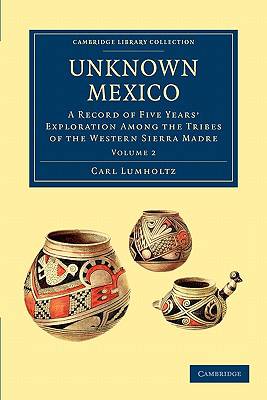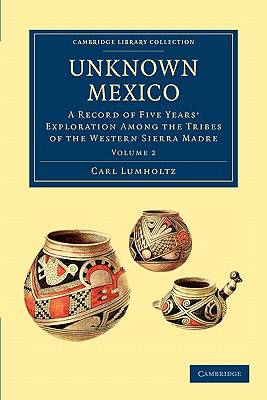
- Afhalen na 1 uur in een winkel met voorraad
- Gratis thuislevering in België vanaf € 30
- Ruim aanbod met 7 miljoen producten
- Afhalen na 1 uur in een winkel met voorraad
- Gratis thuislevering in België vanaf € 30
- Ruim aanbod met 7 miljoen producten
Zoeken
Unknown Mexico - Volume 2
A Record of Five Years' Exploration among the Tribes of the Western Sierra Madre
Carl Lumholtz
€ 111,45
+ 222 punten
Omschrijving
Carl Lumholtz (1851-1922) was a Norwegian ethnographer and explorer who, soon after publishing an influential study of Australian Aborigines (also reissued in the Cambridge Library Collection), spent five years researching native peoples in Mexico. This two-volume work, published in 1903, describes his expeditions to remote parts of north-west Mexico, inspired by reports about indigenous peoples who lived in cliff dwellings along mountainsides. While in the US in 1890 on a lecture tour, Lumholtz was able to raise sufficient funds for the expedition. He arrived in Mexico City that summer, and after meeting the president, Porfirio Díaz, he set off with a team of scientists for the Sierra Madre del Norte mountains in the north-west of Mexico, to find the cave-dwelling Tarahumare Indians. Volume 2 focuses mainly on the neighbouring Huichols people, their daily life, and their religious practices, including shamanism.
Specificaties
Betrokkenen
- Auteur(s):
- Uitgeverij:
Inhoud
- Aantal bladzijden:
- 566
- Taal:
- Engels
- Reeks:
Eigenschappen
- Productcode (EAN):
- 9781108033596
- Verschijningsdatum:
- 27/10/2011
- Uitvoering:
- Paperback
- Formaat:
- Trade paperback (VS)
- Afmetingen:
- 152 mm x 229 mm
- Gewicht:
- 820 g

Alleen bij Standaard Boekhandel
+ 222 punten op je klantenkaart van Standaard Boekhandel
Beoordelingen
We publiceren alleen reviews die voldoen aan de voorwaarden voor reviews. Bekijk onze voorwaarden voor reviews.











